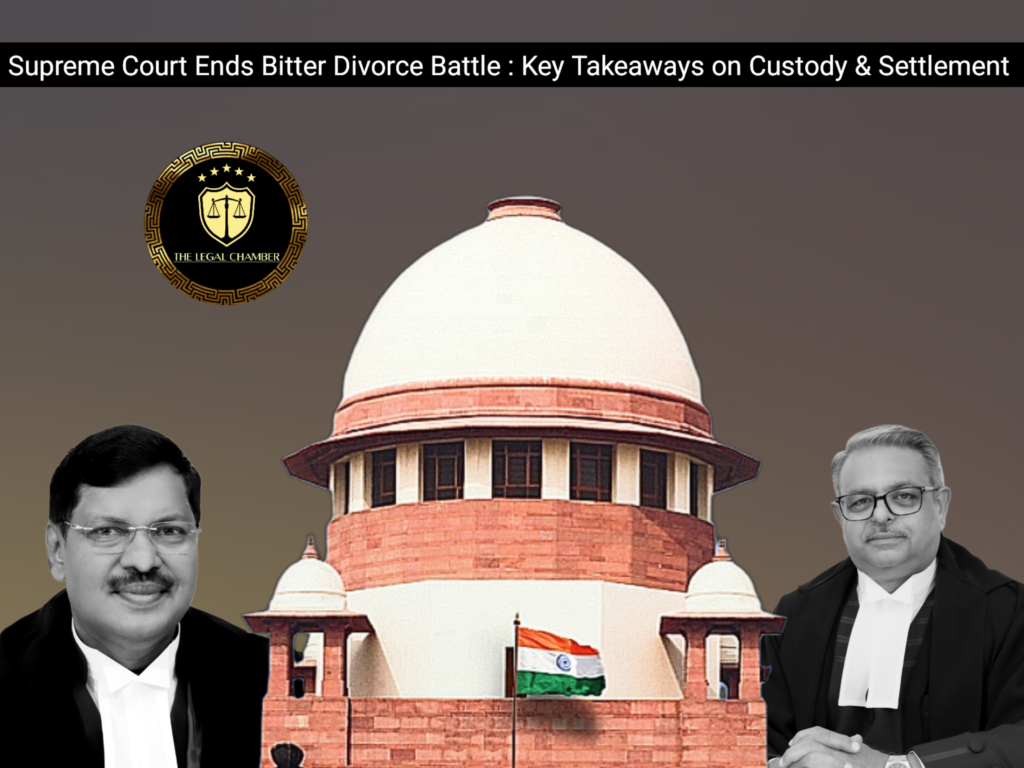
The Supreme Court, invoking Article 142, dissolved the marriage between Shivangi Bansal and Sahib Bansal, quashing all pending civil/criminal cases between them and their families. The wife retained custody of their daughter, while the husband secured visitation rights. Mutual undertakings barred future litigation, and an unconditional apology was mandated. Property transfer and police protection were also ordered, ensuring a conclusive settlement.
Facts Of The Case:
The case involves Shivangi Bansal (wife) and Sahib Bansal (husband), who married in December 2015 and had a daughter in 2016. After marital discord, they separated in October 2018, leading to multiple legal battles across courts in Delhi and Uttar Pradesh. The wife filed cases under Sections 498A, 406 IPC, and the Domestic Violence Act against the husband and his family, while the husband initiated proceedings including a divorce petition (HMA No. 1395/2020) and criminal complaints against the wife’s family. Both parties sought transfer of cases—Shivangi wanted her divorce case moved from Delhi to Hapur, while Sahib sought the opposite. The Supreme Court consolidated these petitions along with related SLPs challenging Allahabad High Court orders quashing FIRs against Sahib’s parents. In its judgment, the Court granted custody of the child to Shivangi with supervised visitation rights for Sahib, quashed all pending cases, and mandated a public apology from Shivangi. Additionally, Shivangi’s mother was ordered to transfer disputed land to Sahib. The Court invoked Article 142 to dissolve the marriage, bar future litigation, and ensure police protection for Sahib’s family. The settlement aimed to end the protracted legal feud while safeguarding the child’s welfare.
Procedural History:
The procedural history of Shivangi Bansal v. Sahib Bansal reflects a protracted legal battle across multiple forums. The dispute originated in 2018 after the couple’s separation, with parallel proceedings filed in Delhi and Uttar Pradesh, including divorce petitions, criminal complaints (e.g., FIRs under Sections 498A, 406 IPC), and domestic violence cases. The wife sought transfer of the husband’s divorce petition from Delhi to Hapur, while the husband filed transfer petitions to move cases from Hapur to Delhi. Concurrently, Special Leave Petitions (SLPs) were filed in the Supreme Court challenging Allahabad High Court orders that quashed FIRs against the husband’s family. The Supreme Court consolidated these transfer petitions and SLPs, exercising its jurisdiction under Article 142 to deliver a comprehensive settlement. The judgment culminated in the quashing of all pending cases, dissolution of marriage, custody arrangements, and mutual undertakings to prevent future litigation, thereby concluding the multi-jurisdictional dispute.
READ ALSO:Supreme Court Exposes Cover-Up, Mandates CBI Investigation for Custodial Violence
Court Observation:
In its observations, the Supreme Court emphasized the need to prioritize the welfare of the minor child, granting custody to the mother (Shivangi Bansal) while ensuring supervised visitation rights for the father (Sahib Bansal). The Court noted the prolonged and acrimonious litigation between the parties, which had led to multiple criminal and civil cases across jurisdictions, causing unnecessary strain on the judicial system. It underscored the misuse of legal provisions like Section 498A IPC and domestic violence laws, urging courts to remain vigilant against such practices. The Bench invoked Article 142 to quash all pending cases between the parties, ensuring a clean break and preventing further litigation. The Court also highlighted the importance of mutual settlements in matrimonial disputes, directing the parties to refrain from making defamatory statements and ordering a public apology from the wife to the husband’s family. Additionally, it upheld the transfer of property as part of the settlement while cautioning against future misuse of authority by either party. The judgment aimed to balance justice with finality, ensuring closure and harmony for both families.
Final Decision & Judgement:
The Supreme Court, exercising its extraordinary powers under Article 142 of the Constitution, delivered a comprehensive and binding settlement to conclusively resolve the dispute. The marriage between Shivangi Bansal and Sahib Bansal was dissolved, with all pending civil and criminal cases between the parties and their families quashed. The Court awarded custody of the minor daughter to Shivangi, granting supervised visitation rights to Sahib, and mandated the withdrawal of all maintenance claims. As part of the settlement, Shivangi’s mother was directed to transfer specified land to Sahib, while Shivangi was ordered to issue a public apology to the Bansal family in national newspapers and social media. The judgment imposed strict prohibitions on future litigation and defamatory statements, with violations to be treated as contempt of court. Police protection was granted to Sahib’s family, and the Court expunged adverse remarks against Shivangi from prior rulings. By invoking Article 142, the Bench ensured finality and equitable closure, balancing legal principles with the welfare of the child and the parties’ dignity. The decision stands as a precedent for resolving high-conflict matrimonial disputes with judicial authority and fairness.
Case Details:
Case Title:Shivangi Bansal (Petitioner) vs. Sahib Bansal (Respondent)
Citation:2025 INSC 883
Appeal No : Special Leave Petition (Criminal) Nos. 7869/2022, 11848/2022 & 2282/2023
Date of Judgment: 22nd July 2025
Judges/Justice Name: Justice B.R. Gavai & Justice Augustine George Masih
Download The Judgement Here